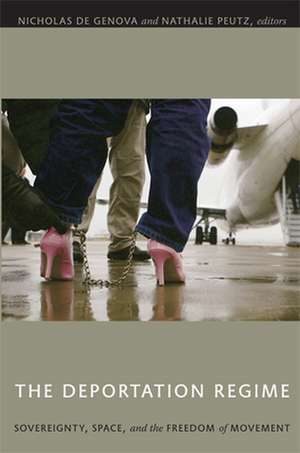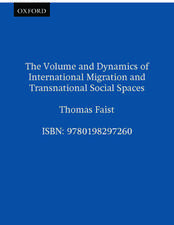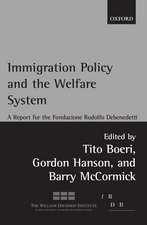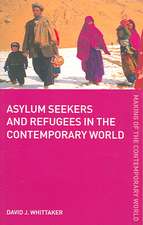The Deportation Regime – Sovereignty, Space, and the Freedom of Movement
Autor Nicholas De Genova, Nathalie Peutzen Limba Engleză Paperback – 14 apr 2010
Preț: 311.22 lei
Nou
Puncte Express: 467
Preț estimativ în valută:
59.55€ • 62.33$ • 49.57£
59.55€ • 62.33$ • 49.57£
Carte tipărită la comandă
Livrare economică 01-15 aprilie
Preluare comenzi: 021 569.72.76
Specificații
ISBN-13: 9780822345763
ISBN-10: 0822345765
Pagini: 522
Ilustrații: 1 table
Dimensiuni: 189 x 234 x 37 mm
Greutate: 0.74 kg
Editura: MD – Duke University Press
ISBN-10: 0822345765
Pagini: 522
Ilustrații: 1 table
Dimensiuni: 189 x 234 x 37 mm
Greutate: 0.74 kg
Editura: MD – Duke University Press
Cuprins
Contributors: Rutvica Andrijasevic, Aashti Bhartia, Heide Castañeda, Galina Cornelisse, Susan Bibler, Coutin, Nicholas De Genova, Andrew M. Gardner, Josiah Heyman, Serhat Karakayali, Sunaina Marr Maira, Guillermina Gina Nuñez, Peter Nyers, Nathalie Peutz, Enrica Rigo, Victor Talavera, William Walters, Hans-Rudolf Wicker, Sarah S. Willen
Recenzii
"This collection is truly impressive. It demonstrates the importance of deportation as a mechanism for producing citizenship and alienage, nations, states, and territories in both theory and practice....There is much to be done, and this book outlines an emerging research agenda." Bridget Anderson, Journal of the Royal Anthropological Institute
The Deportation Regime is an important and timely book, both for theory and for politics. A series of well-written case studies (from across the world) accompanied by a smart theoretical overview by Nicholas De Genova, the collection urges us to see the undocumented migrant/sans papiers/deportable alien/stateless citizen as paradigmatic of our time, as norm rather than exception, and thus as constitutive of sovereignty and the political today.--Charles Piot, author of Remotely Global: Village Modernity in West Africa
This valuable collection of essays treating deportation as a distinct form of state social control shows convincingly that deportation demands more specific attention from social theorists. The ethnographically rich and theoretically informed essays provide fascinating case studies on the functioning of the deportation regime in different national settings.--Linda Bosniak, author of The Citizen and the Alien: Dilemma of Contemporary Membership
"This collection is truly impressive. It demonstrates the importance of deportation as a mechanism for producing citizenship and alienage, nations, states, and territories in both theory and practice...There is much to be done, and this book outlines an emerging research agenda." Bridget Anderson, Journal of the Royal Anthropological Institute "The Deportation Regime is an important and timely book, both for theory and for politics. A series of well-written case studies (from across the world) accompanied by a smart theoretical overview by Nicholas De Genova, the collection urges us to see the undocumented migrant/sans papiers/deportable alien/stateless citizen as paradigmatic of our time, as norm rather than exception, and thus as constitutive of sovereignty and the political today."--Charles Piot, author of Remotely Global: Village Modernity in West Africa "This valuable collection of essays treating deportation as a distinct form of state social control shows convincingly that deportation demands more specific attention from social theorists. The ethnographically rich and theoretically informed essays provide fascinating case studies on the functioning of the deportation regime in different national settings."--Linda Bosniak, author of The Citizen and the Alien: Dilemma of Contemporary Membership
The Deportation Regime is an important and timely book, both for theory and for politics. A series of well-written case studies (from across the world) accompanied by a smart theoretical overview by Nicholas De Genova, the collection urges us to see the undocumented migrant/sans papiers/deportable alien/stateless citizen as paradigmatic of our time, as norm rather than exception, and thus as constitutive of sovereignty and the political today.--Charles Piot, author of Remotely Global: Village Modernity in West Africa
This valuable collection of essays treating deportation as a distinct form of state social control shows convincingly that deportation demands more specific attention from social theorists. The ethnographically rich and theoretically informed essays provide fascinating case studies on the functioning of the deportation regime in different national settings.--Linda Bosniak, author of The Citizen and the Alien: Dilemma of Contemporary Membership
"This collection is truly impressive. It demonstrates the importance of deportation as a mechanism for producing citizenship and alienage, nations, states, and territories in both theory and practice...There is much to be done, and this book outlines an emerging research agenda." Bridget Anderson, Journal of the Royal Anthropological Institute "The Deportation Regime is an important and timely book, both for theory and for politics. A series of well-written case studies (from across the world) accompanied by a smart theoretical overview by Nicholas De Genova, the collection urges us to see the undocumented migrant/sans papiers/deportable alien/stateless citizen as paradigmatic of our time, as norm rather than exception, and thus as constitutive of sovereignty and the political today."--Charles Piot, author of Remotely Global: Village Modernity in West Africa "This valuable collection of essays treating deportation as a distinct form of state social control shows convincingly that deportation demands more specific attention from social theorists. The ethnographically rich and theoretically informed essays provide fascinating case studies on the functioning of the deportation regime in different national settings."--Linda Bosniak, author of The Citizen and the Alien: Dilemma of Contemporary Membership
Notă biografică
Textul de pe ultima copertă
"This valuable collection of essays treating deportation as a distinct form of state social control shows convincingly that deportation demands more specific attention from social theorists. The ethnographically rich and theoretically informed essays provide fascinating case studies on the functioning of the deportation regime in different national settings."--Linda Bosniak, author of "The Citizen and the Alien: Dilemma of Contemporary Membership"
Descriere
An interdisciplinary collection on the role of deportation in national security policy












